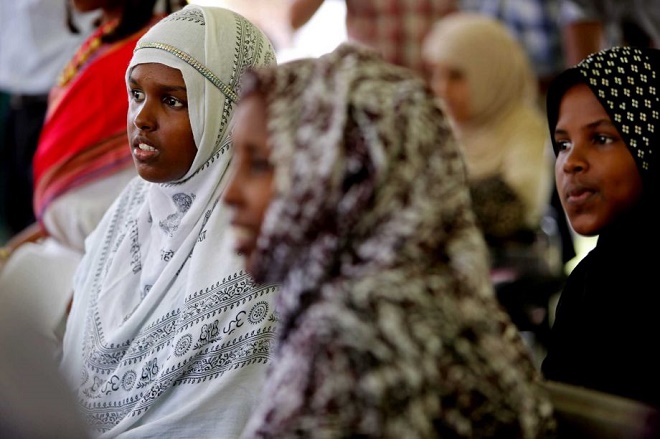
Nimo Adan, 16, left, and sister Hawo Adan, 10, far right, of Somalia, now reside in Houston. They were among visitors Saturday to the University of St. Thomas to celebrate World Refugee Day with cultural entertainment and educational exhibits. Photo: Gary Coronado, Staff

By Lomi Kriel
Sunday, June 14, 2015
advertisements
Some days Fatima Ali can't believe any of this is real: The three-bedroom apartment in Memorial, the job at a Randalls bakery, the bus that arrives each morning to take her kids to school.Just six months ago she and her five children were reinforcing their mud huts in a Ugandan refugee camp after every rainfall, surviving on meager rations of maize and rice and an abundance of hope. There wasn't much else to cling to after fleeing the Somalian civil war in 2007 when fighters bombed their house, killing Ali's parents.
"We were in a war for so many years, just fleeing from country to country," she said Saturday as she watched her children dart around the University of St. Thomas, where hundreds of refugees had descended in a cornucopia of color with bright head scarves and traditional dress. "We are so happy to be here where we are safe."
Started by the United Nations in 2001, World Refugee Day celebrates more than 50 million people across the globe forced out of their homes by war and human rights abuses. In Houston, which has resettled the most in the nation for the past two years, 70,000 refugees from 78 countries call the city home. More than 4,800, with the majority of them from Iraq and Cuba, came to Harris County last year, according to state health department statistics.
"We came to this country empty-handed with nothing but the clothes on our back," said Houston City Councilman Richard Nguyen, a refugee from Vietnam who arrived in 1975 during the evacuation of Saigon and who spoke at Saturday's event. "We didn't know the language - we had to learn how to communicate. We didn't know the culture - we had to learn how to assimilate."
Difficult resettlement
For some it's a more challenging process than others. Refugees from Iraq, Iran and Syria, for instance, are often highly educated so it's easier for them to find work. But those from countries ravaged by war for decades, like the Democratic Republic of Congo or Eritrea, don't have the same levels of schooling.
Congress sets the ceiling of refugees at 70,000 and almost half last year came from the near East and south Asia, including Iraq, Iran, Bhutan and Afghanistan. By law, they receive government stipends for up to three months and federal grant programs can support them a little longer. But the money quickly ends and then the onus is on them. Though resettlement agencies provide job training and career counseling, it's often difficult.
Ali, a slender 47-year-old with a purple head scarf and a gentle manner, learned English at the camp in Uganda. So did her children.
But not everyone has that opportunity. Their friend, 55-year-old Muhammad Shukri Kadiye, spent more than two decades at the world's largest refugee post in Dadaab, Kenya, after he and his family fled Somalia in the 1990s. Now that he and his eight kids have been in Houston for six months, his government aid has run out, and he doesn't know the language.
"I don't know what to do and I'm very confused," he said through a translator as he sat on a park bench in his long traditional white dress. "I just don't understand. Maybe I should go back to Africa."
Margaret Ayot, program supervisor for refugee services at Catholic Charities of the Archdiocese of Galveston-Houston, said she tries to encourage companies to hire refugees. Her latest success story is a Rwandan man, the father of nine children, whom Wal-Mart hired as a packer despite speaking no English.
"Once a refugee understands what they need to do, they'll do it and they'll do it really well," Ayot said. "They'll never call in and they'll work incredibly hard because they're just so proud to have a job."
'Think of the future'
Though Ali is grateful for her work at Randalls, it's only part-time. Her eldest son, 23-year-old Abdirahman Dolal, helps pay the bills through his job as a computer technician at Foxconn, a technology company. But Ali worries. Once the lease is up she plans to move into a cheaper apartment. "Sometimes I just cannot stand it," she said, ticking off her expenses as her eyes darkened in concern. And she misses her husband, who is "somewhere in Africa," she said before welling up in tears.
"With two it is just a lot easier to make decisions than one," she said.
Like his mother, Dolal also doesn't like dwelling on the past.
"I don't even want to remember that because it was so horrible," he said. "I want to think of the future. I have a lot of dreams."
First, he wants to go to community college. He wants to be an accountant. Then after a few years he wants to do chemical engineering. Finally, he wants to become a pilot.
"Step by step," he said breezily. "Here you have the chance to be who you are. There, it's who is your godfather, your relative. But here it's your capacity and your energy."